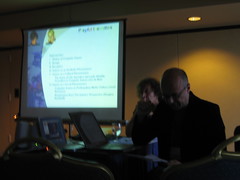The Game of Life: Narrative and Ludic Identity Formation in Computer Games; Jos de Mul (Thursday)
Jos de Mul and his colleagues have made an impressive framing in order to close into their core focus; Identity formation in computer games. For me, this is of course highly relevant. They are entering into a project that will span over several years as they explore this, and I will, as far as I can, follow their work closely. They are using an interdisciplinary approach, which they summarised. I threw down some notes while listening, but it was so quick so I'm not sure this will be either correct or make sense:
1. Narrative identity and mimesis as lived experience, expression and self-understanding. In this they draw upon the writings of Paul Riceur, but also recognizes the flaw of it being so focussed on narrative in the traditional way.
- They would rather use the expression ludic identity and play as
o Lived, a playful configuration of human every day life.
o Expression via ludic actions and
o Reflective self-understanding via play.
2. Another perspective is the media theoretical;
- Descriptions of media specific characteristics of ludic media
- Comparative analysis of general differences between narrative and ludic expressions
- Technological-interactionst approach.
They also juxtapose autonomous self-construction versus commercialization, globalization and technological homogenization.
2. Qualitative-Empirical approach where the domestication of technology would be viewed in terms of a) commodification b) appropriation and c) conversation.
They will also be looking at program design, and identity formation in different contexts, in this case technological platforms; a) mobile identity, b) web identity, c) game identity. Game Identity would be between homogenization and heterogenization.
At this point in the speech a new speaker was introduced: Joost Raessens (Utrecht). He spoke about domains of participation, and re- and de-construction of these. The reconstruction would be an exploration of a navigable space and selections in that. The deconstruction would be a demystification of simulation resulting in a better understanding of simulations. Here he referred to Turkle and her thoughts on how we are being seduced by simulations.
He also presented a political and ideological perspective where in particular they would look at:
1. Top-down versus bottom-up
2. Homogenization vs. heterogenization
3. The real (true world) versus the possible (fable)
All in all I realize I need to look deeper into their work; to make sense of these, to me, very interesting but rushed notes. In particular I would like to know how they would approach the social-communicative aspect if identity construction where identity is built by being mirrored in other individuals. I would also like to know if they are making any difference between self-identity and fictive character identities, and if so, how.
http://www.gamesconference.org/digra2005/viewabstract.php?id=131
